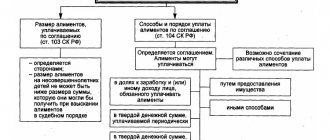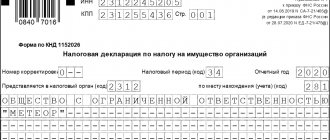Legislation on the collection of alimony
The main legislative act that defines the mechanism for providing financial assistance by withholding alimony is. It regulates the responsibilities of parents to support their minor children, as well as mutual support for each other. The fundamental rules are set out in, which is entirely devoted to regulating the procedure for assigning and the process of collecting alimony payments in favor of some family members by others. The main attention is paid to the standards for withholding funds in favor of children from their parents.
the obligation of parents to provide material support for their minor children is established, independently determining the form and procedure for maintenance, as well as the ability of parents to enter into a child support agreement. – The Russian Federation has determined the amounts and types of collection of alimony payments for common children, as well as the income from which they are withheld. , the methods for collecting alimony are outlined, and the articles describe the algorithm for withholding alimony payments in practice and measures to eliminate debt on them.
The regulatory function in matters of collection of alimony is performed by (parts 1-3) and codes, as well as in the new edition.
How much child support should a father pay?
The amount of alimony that a father will have to pay to help his children depends on the number of children in the family. The provisions of Article 81 of the RF IC suggest:
- The amount of alimony payments that are subject to monthly payment for the purpose of maintaining minors is: 1/4 of the father’s income - if there is only one child, 1/3 of the father’s income - if there are two children, 1/2 of the income for three or more children. At the same time, it is possible to make deductions in a minimum amount, which is determined as a percentage of the minimum wage.
- The court may increase or decrease the amount of alimony payments. The basis for such a change is a change in the financial situation of the father, the incapacity of one of the parents, a change in the current standard of living of the children and other factors.
The types of income from which the law provides for the possibility of withholding alimony are established by Decree of the Government of the Russian Federation No. 841 of July 18, 1996. Such income includes:
- payments payable to municipal employees;
- fees paid by media editors;
- salary;
- pensions, social benefits;
- scholarships paid to university students.
Article 82 of the RF IC assumes that the full list of income from which alimony should be withheld is determined by the Government of the Russian Federation.
What are alimony obligations and alimony?
Property legal relations regulated by family law, which arise on the basis of an agreement between the parties or by a court decision, are called alimony obligations. They determine the obligation of some family members to provide material support to others, and the latter are assigned the right to demand them.
Such obligations are determined by the RF IC according to the subjective composition for three groups of citizens:
- – children and parents, as well as other family members;
- – spouses and former spouses.
The legislation regulates the procedure for determining the amount of alimony payments, provides for their forms, and also spells out the mechanism for assigning and withholding.
Find out more about what alimony is.
Amount of child support for one child
The amount of alimony for minor children depends on a number of conditions: the number of minors, the basis for payments (an agreement between mother and father or a court decision to impose payments on one of the parents), whether the ex-spouse from whom funds are collected for the minor works or does not work. All this affects the amount of alimony.
The minimum amount of alimony for an only child by court decision is a quarter of all earnings of the father (mother) from whom payments are collected.
If an alimony agreement is drawn up between former spouses, then reducing the amount of alimony to less than a quarter of the minimum earnings is illegal. Accordingly, the amount of child support for two children will be greater.
Alimony during pregnancy
The right to collect alimony for a wife during pregnancy and until the common child reaches the age of 3 years is secured. At the time of collection, the spouses may be in a registered marriage or be legally divorced. However, from the moment of divorce until the moment when the ex-wife found out about her pregnancy, according to the law, no more than 300 days should pass.
There are two options for collecting alimony for a pregnant wife:
- voluntary - by concluding a notarized alimony agreement indicating the procedure for paying alimony, the amount of deductions, and the timing of payments;
- forced - through filing an application for the collection of alimony to the court at the defendant’s place of residence.
If a voluntary agreement is not signed, the right to calculate (recalculate) the amount of alimony for a pregnant wife (former or current) is reserved by law to the court.
Find out the details of how alimony is collected for a pregnant woman and child for up to 3 years.
Alimony agreement
If the child’s parents come to a mutual agreement on the issue of maintaining a minor, the Family Code of the Russian Federation provides for the opportunity to secure this notarially by drawing up a written agreement on child support obligations. An important condition is that alimony in this case cannot be less than the minimum amount of alimony.
Mandatory components of such an agreement will be the amount of payments, as well as their frequency. The amount of payments will depend primarily on the number of minors who remain in the care of the mother or father. In an alimony agreement, the amount cannot be less than it would have been if the court had applied to impose alimony obligations. That is, it cannot be less than the minimum amount of alimony.
A prerequisite for the legality of such an agreement is to have it certified by a notary. Experts recommend drawing up a preliminary agreement in which the parties discuss all the nuances of payments, and then make an appointment with a notary, who will not only certify the agreement, but also draw up a legally competent document.
If the alimony agreement is not certified by a notary, then legally it does not exist, and subsequently cannot be accepted by the court as evidence of non-payment of alimony (for example, in a claim for deprivation of one of the spouses of parental rights).
If the mother or father fails to comply with the terms of the agreement, the parent in whose favor the agreement was drawn up has the right to apply to the bailiffs to initiate enforcement proceedings. The original agreement must be attached to the application.
An agreement can be drawn up not only in the event of divorce, but also when spouses live together but maintain a separate household or, for example, one of the spouses does not work. In this case, the amount of alimony for one child or the amount of alimony for two children, or for a larger number of children, is determined by mutual agreement.
Is it possible to find out about alimony through accounting?
If it was not possible to reach an agreement on the voluntary payment of alimony and conclude an alimony agreement, moreover, the relationship between the spouses (former or present) is so inadequate that the wife filed for alimony and did not even inform her other half about it, find out about the fact of their accrual, the amount and the deduction procedure is possible in the accounting department of the enterprise where the alimony payer is employed. As a rule, a copy of the court order and a writ of execution should be received there, on the basis of which the accounting staff will withhold alimony payments.
, and the algorithm and timing of the procedure for collecting alimony payments through the accounting department are determined, and the responsibilities of this unit for their retention are outlined.
Should a father pay child support if he is deprived of parental rights?
The consequences that occur after depriving the father of a child of parental rights are regulated by Article 71 of the RF IC. Paragraph 2 of the above article provides for the preservation of the obligation to support the child. Thus, despite the fact that the parent is deprived of his rights, he must pay alimony in the amount provided for in Art. 81 of the RF IC or a court decision.
The basis for depriving a father of parental rights may be evasion of his duties as a parent, including payment of alimony. Having reached the age of majority, the child will have no obligations towards his father, who has been deprived of parental rights. He may not pay him alimony and not provide other necessary assistance as defined in Article 87 of the RF IC. Along with this, the benefits, including the right of inheritance, of the child in relation to the father and relatives along his line are preserved.
What to do if a claim for alimony has already been filed
A peaceful way to resolve the issue of alimony for the maintenance of common minor children or a wife on maternity leave, unfortunately, is a rather rare phenomenon in society. The most common option is to collect and withhold alimony payments through the court. Moreover, the proceedings for their accrual can be:
- orderly;
- claimable.
The first option is the most comfortable for the plaintiff, since it does not require the appearance of either him or the defendant, and the decision is made by the judge based on the study of documents.
Often, a potential alimony payer learns of the fact that in the future he will have to allocate part of his income to support a child shared with his wife, having received a court order, or after funds have already been withheld from wages.

There may be two solutions to the question of what to do if you have filed a lawsuit for alimony - pay money in the amounts determined by the court order, or cancel it and take part in court hearings to collect alimony, which will be carried out in the manner of litigation.
Conduct in court and payment options
If the defendant decides to take part in court hearings to collect alimony from him in favor of common children due to the fact that he objects to the very fact of withholding alimony payments or their amount, he must build a line of defense for his own position and competently, with the provision of evidence, defend it during court hearings, when he is given the opportunity to do so.
If the defendant has changed his attitude to the subject of the dispute and decided to agree with the spouse’s demand for alimony in the form in which they are requested in the statement of claim, he can complete the court hearing with his statement that he supports the claim in full. Otherwise, the hearing will continue.
You can state your position when the court invites the parties to provide explanations on the subject of the dispute and then during the debate and during the exchange of remarks.
By the beginning of the trial, the court must have at its disposal all the evidence, and witnesses must be present at the hearing (if necessary). The court may assign various payment options, which in different situations involve withholding in:
- shares of income;
- a fixed amount with payment at certain time intervals;
- combinations of the above options.
The defendant in the case has the right to prepare objections to the wife’s claim. They may also file a counterclaim in accordance with the rules -. For example, if a spouse files for withholding of alimony in a fixed amount of money, then the defendant can file a request for a complete exemption from payments if there are compelling reasons for this.
Options for action in various situations
Depending on the situation in which the potential alimony payer finds himself, his line of behavior has its own nuances. In some cases, you can try to challenge the court decision to collect alimony or its amount if you are firmly convinced that you are right. This is possible if the defendant, for example, doubts biological paternity or the ex-wife applied for alimony, having her own high income, while the defendant belongs to a low-paid category of citizens or currently has no income at all.
What to do if a common-law wife filed a claim for alimony
According to the legislation of the Russian Federation, children of one parent, born in a legal marriage and born without a marriage union, are endowed with the same rights, including material support until they reach adulthood. A woman who has a child in an unregistered family relationship with a man can file for recovery of alimony from him in favor of the common child. In this case, if the paternity of the possible defendant is not disputed and he is included in the birth certificate with his own written consent, alimony will be collected from the defendant in the same way as for a child whose marriage with his mother is officially registered.

In cases where paternity is disputed and not documented, the common-law wife has no legal grounds to file such a claim. It will become possible only if biological paternity is confirmed by a special procedure for establishing it.
What to do if your mistress applies for alimony
If alimony claims are made against a man by a woman with whom he did not live together and did not have a joint household, her demands for maintenance of a child born as a result of such a relationship will be valid in the same cases as when filing a claim. "common-law wife" Since, according to the law, there is the only legally valid type of family relationship between a man and a woman - this is a marriage union registered with the registry office according to the procedure established by law, after which they become husband and wife.
In all other cases, it does not matter what the woman is called - mistress, common-law wife or cohabitant; alimony for a child born outside of a legal marriage can be recovered by her only after going through the procedure for establishing paternity, if the man has not recognized himself as such and has not secured it legal recognition in the registry office.
What to do if your child lives with his grandmother
A situation where, after the parents’ divorce, a common child lives with his grandmother, and his mother receives alimony for him, who spends the money not on the maintenance of the child, but on her own needs, may be a reason to go to court. The court, at the request of a parent from whom alimony for minor children is being collected, has the right to make a decision to transfer no more than half of the amount of alimony to accounts that are opened in the name of a minor child in a banking institution ().
When can a father demand child support?
A father has the right to demand help from his children, but not always. This is determined not only by moral, but also by federal laws.
Following Article 87 of the Family Code of the Russian Federation, the father has the right to receive alimony for his maintenance from the children if he is disabled.
Disability means old age or disability. To confirm disability, you must obtain a certificate from the ITU.
Those men who are 60 years or older are considered disabled.
Alimony for the maintenance of the father is paid if he does not have income for a full-fledged existence. For 2021, such income is considered the minimum necessary for living.
What to do if your second wife applies for alimony?
In life, a situation often arises when, after the dissolution of one marriage in which children were born, a man creates a second family, where a child is also born. If a man already pays alimony to a child from his first marriage, his second wife can also apply for alimony from him, regardless of whether they are still married or the marriage has been dissolved. This can happen for various reasons, including so that the spouse has legal reasons to go to court to reduce the amount of payments to the child in the first family.

Based on the norms, a change in the family and financial status of the person paying alimony is the basis for reducing alimony for a child from a first marriage. If the second wife wants to provide financial support for a common child, then in any case, no more than 1/3 of his income will be collected from the alimony payer, as required by law for the maintenance of two children, which means 1/6 for each.
Voluntary agreement on alimony payments to the second wife
The situation when the second wife also intends to receive alimony from her husband for the maintenance of their common children can be resolved (as in the first case) in two ways - by signing an alimony agreement and issuing a court decision or order. The simplest and most civilized way is a notarized agreement on the payment of alimony, which will specify the amounts, terms, procedure for payments and other nuances of receiving financial assistance to a minor child.
Read more about concluding an alimony agreement.
Collection of alimony for the second wife in court
If mutual understanding on the issue of concluding an alimony agreement with the second wife has not been reached, their appointment is made in court. Moreover, when appointing them, the court will take into account the fact that the defendant is already paying maintenance in favor of minor children in a previous marriage, and the amount of monetary deductions for children from a second marriage cannot be assigned with an infringement on the rights of any of them.
With the advent of new children in the families of the alimony payer, real payments to each of them decrease proportionally.
Also in this case, the amount of allowable deductions from the payer’s income cannot be exceeded, which, in accordance with the provisions of the RF IC, cannot exceed 50% of income. And according to the provisions, if there are arrears of alimony, it should not exceed 70% of the father’s total income.
Find out more about collecting alimony.
Conditions for adult children for collection
Both parents and children must meet certain conditions to qualify for child support. These include:
- provision of a document that officially confirms the presence of a family relationship (and its role can be played by a banal birth certificate);
- age category of children starting from 18 years old;
- confirmed ability to work and availability of a certain level of income;
- facts that establish that parents need financial assistance.
The law contains a reference that even if adult children do not have stable earnings, they are not exempt from the obligation to pay child support in favor of needy parents.
In what cases is it possible to be exempt from alimony payments?
In some cases, a parent may be released from the obligation to pay support to their minor children. This happens if:
- biological paternity has been legally disproven;
- the child is adopted by the new spouse of his mother;
- children live with their father and are supported by him;
- in the pre-trial period, the payer made a one-time payment in the amount of alimony for the time before the child reached the age of 18;
- the second parent refused to receive them.
Alimony payments are not assigned if the recipient has entered into a legal marriage or has acquired full legal capacity.
Lack of work is not a reason for exemption from alimony
In accordance with Russian legislation, lack of work is not grounds for exempting a parent from paying child support to his minor children. In this case, the court may order payments not in shares of income, but in a fixed amount, which will be “tied” to the minimum wage in the region. In addition, the father can register with the Employment Center, receive official unemployed status and a benefit from which forced deductions will be made.
The amount of alimony from a non-working spouse. Minimum amount of alimony
The Russian state guards the interests of minors. Therefore, if a parent obligated by a court decision to pay alimony has no income, other conditions for assigning mandatory payments to the child (children) are determined by law. According to this procedure, the amount of child support is determined for one child, for two or more.
This also comes from the lack of understanding of a large number of fathers and mothers of the need to provide decent support for their children. They try in every possible way to escape the obligations imposed by the court decision on material support: they work without official employment or try in every possible way to hide official earnings, as an option, they constantly change jobs or do not work at all and live on their parents’ pension. Based on this, they are asking to reduce the amount of alimony.
Unfortunately, the average amount of alimony is not regulated by law, and there is no exact formula for calculating it, therefore, in civil proceedings, courts proceed from the actual circumstances of the case, determining the amount of alimony, which cannot be less than the minimum amount of alimony.
In order to determine the amount of alimony from a non-working spouse, the courts take as a basis the minimum wage established in Russia at the time of consideration of the civil case on alimony. Currently, the minimum wage in Russia is 7,500 rubles, based on this, depending on the number of children, the minimum amount of alimony can be calculated. The amount of child support for one child will be 1875 rubles. The amount of alimony for two children is 2500 rubles. The amount of alimony for three children and more than 3,750 rubles.
The defendant’s lack of income does not mean that his obligation to pay child support for minor children is relieved. In addition to using the method in which the minimum amount of alimony depends on the amount of the minimum wage, the court can use the second method. This means that the amount of child support for two children or one will be calculated based on the average salary in the country.







